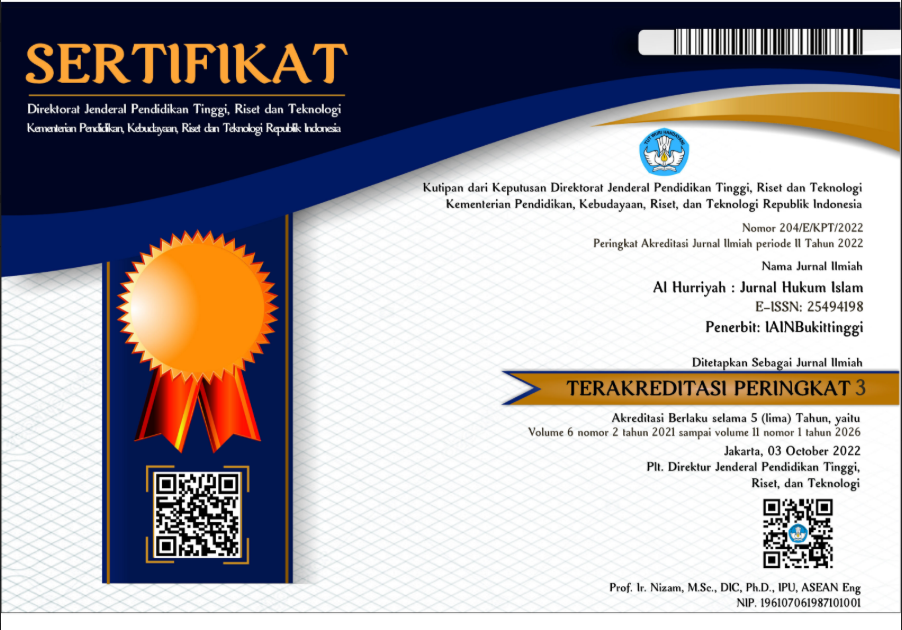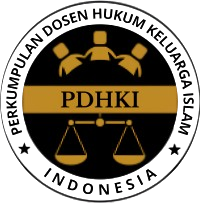HAK WARIS ANAK LAKI-LAKI TERTUA DALAM HUKUM ADAT LAMPUNG PEPADUN PERSPEKTIF GENDER (STUDI DI TEGINENENG KABUPATEN PESAWARAN)
DOI:
https://doi.org/10.30983/alhurriyah.v4i1.938Keywords:
Inheritance Rights of Terua Boys, Traditional Lampug Pepadun, GenderAbstract
References
Asri Thaher. “Sistem Pewarisan Kekerabatan Matrilineal Dan Perkembangannya Di Kecamatan Banuhampu Pemerintahan Kota Agam Propinsi Sumatera Barat.†PhD Thesis, Universitas Diponegoro, 2006.
Astuti MR, Juli. “Kedudukan Anak Luar Kawin Dalam Pewarisan Adat Di Kecamatan Colomadu Kabupaten Karanganyar.†PhD Thesis, Universitas Diponegoro, 2004.
Departemen Agama RI. Al-Qur’an Dan Terjemahnya. Bandung: CV. J-ART, 2005.
Fikri & Wahidin, Fikri & Wahidin. “Konsepsi Hukum Waris Islam dan Hukum Waris Adat (Analisis Kontekstualisasi dalam Masyarakat Bugis).†Al-Ahkam: Jurnal Ilmu Syari’ah dan Hukum 2, no. 2 (January 8, 2017). doi:10.22515/al-ahkam.v2i2.500.
Ghani, Abdul. “Wawancara Dengan Kepala Keluarga Adat Lampung Pepadun.†Bumi Agung, Kec. Tigeneneng, Kab. Pesawaran, December 15, 2018.
Hadikusuma, Hilman. Hukum Waris Adat. Bandung: Citra Aditya Bakti, 1990.
———. Pengantar Ilmu Hukum Adat Indonesia. Bandung: Mandar Maju, 1992.
Jalil, Jalil. “Wawancara Dengan Salah Satu Anak Pepadun Dengan Gelar Adat Pangeran.†Desa Rejo Agung Kec. Tigeneneng, Kab. Pesawaran, December 21, 2018.
Jamaa, La. “Dimensi Ilahi dan Dimensi Insani dalam Maqashid al-Syari’ah†45 (2011): 20.
Komari. “Eksistensi Hukum Waris Di Indonesia: Antara Adat Dan Syariat.†Asy-Syari’ah 17, no. 2 (August 2015): 158–72.
M. Syifa’uddin, Achmadi. Pintar Ilmu Faraidl Pilihan Tepat Meredam Sengketa Harta Waris. Cet. 1. Surabaya: Khalista, 2006.
Mukhlishin, A, Nur Alfi Khotamin, Ari Rohmawati, and Ariyanto Ariyanto. “Studi Hukum Islam Terhadap Kewarisan Masyarakat Adat Semendo Kabupaten Lampung Barat Di Era Kontemporer.†ULUL ALBAB Jurnal Studi Islam 18, no. 1 (July 31, 2017): 84. doi:10.18860/ua.v18i1.4125.
Rusyd, Ibnu. Bidayatul Mujtahid Analisis Fiqih Para Mujtahid. Jilid. 3, Cet. III. Jakarta: Pustaka Amani, 2007.
Saebani, Beni Ahmad. Fiqh Mawaris. Cet. 1. Bandung: CV. Pustaka Setia, 2009.
———. Fiqh Mawaris. Cet.3. Bandung: CV. Pustaka Setia, 2015.
Sakirman. “Konvergensi Pembagian Harta Waris Dalam Hukum Islam.†ALHURRIYAH: Jurnal Hukum Islam 2, no. 1 (July 18, 2017): 45-56–56. doi:10.30983/alhurriyah.v2i1.261.
Shihab, M. Quraish. Membumikan AL-Qur’an: Fungsi Dan Peran Wahyu Dalam Kebudayaan Masyarakat). Cet. IV. Bandung: Mizan, n.d.
Soekamto, Soejono. Pengantar Hukum Adat Indonesia. Jakarta: Rajawali, 1993.
Suparman, Eman. Hukum Waris Indonesia Dalam Perspektif Islam, Adat Dan BW. Jakarta: Refika Aditama, 2005.
Umar, Nasaruddin. Perspektif Jender Dalam Al-Qur’an, Disertasi,. Jakarta: Program Pascasarjana IAIN Syarif Hidayatullah, 1999.
Wignjodipoero, Soerojo. Pengantar Dan Asas-Asas Hukum Adat. Jakarta: PT. Toko Gunung Agung, 1995.
Downloads
Published
How to Cite
Issue
Section
Citation Check
License
Authors who publish with this journal agree to the following terms:
- Authors retain copyright and grant the journal right of first publication with the work simultaneously licensed under a Creative Commons Attribution-ShareAlike 4.0 International License that allows others to share the work with an acknowledgment of the work's authorship and initial publication in this journal.
- Authors are able to enter into separate, additional contractual arrangements for the non-exclusive distribution of the journal's published version of the work (e.g., post it to an institutional repository or publish it in a book), with an acknowledgment of its initial publication in this journal.
- Authors are permitted and encouraged to post their work online (e.g., in institutional repositories or on their website) prior to and during the submission process, as it can lead to productive exchanges, as well as earlier and greater citation of published work (See The Effect of Open Access).





